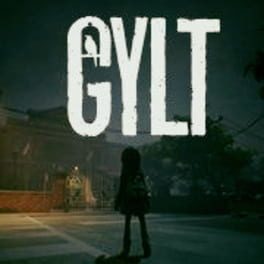
The stealth mechanics are pretty basic in their scope, but it works well within the context of the game itself. Thankfully, GYLT fares better when it comes to the gameplay which involves sneaking through dark environments while avoiding the many enemies that lie in your path. Those who want more out of the narrative can check out the text logs scattered throughout the environments, but that isn’t a replacement for a story that’s just weak in its bones. Nothing eventful really happens for a solid chunk of the runtime.

There are also no interesting NPCs except for that one old stranger who makes an appearance at several points throughout the story. What happens in GYLT is that despite searching for Emily for a majority of the story’s runtime before it all prematurely concludes with a simple resolution to that central conflict, ultimately leaving a sour taste in your mouth. The voice acting is also well done, and it does a good job of portraying Sally as a character that’s worth rooting for." "The story itself has a simple premise, and Sally is a well-written protagonist with all the innocent charm and personality one would expect from such a young character.

The problem with the game’s story is that it isn’t really fleshed out in any meaningful way. Her backstory also reveals itself in layers, and the game also briefly touches upon heavy themes like bullying, depression, or survivor’s guilt – but the narrative rarely does justice to these serious topics.

The voice acting is also well done, and it does a good job of portraying Sally as a character that’s worth rooting for. The story itself has a simple premise, and Sally is a well-written protagonist with all the innocent charm and personality one would expect from such a young character. It is here that she starts seeing the first signs of her lost cousin Emily, but the path to rescuing her is wrought with all sorts of dangers like shadow monsters and otherworldly creatures. She is soon ambushed by bullies, and her escape plan leads her to a simple-looking cable cart that takes her to a dark and abandoned version of the town of Bethelwood. GYLT starts out simply enough, with the player assuming the role of Sally – a young and impressionable girl who embarks on a quest to find her missing cousin by putting relevant posters all across her hometown.
Gylt rating Pc#
But that’s not entirely true because Stadia did have a couple of interesting games to its name, including but not limited to Tequila Works’ GYLT which has now made its way over to consoles and PC – allowing anyone who previously didn’t get a chance to play this narrative adventure to have a shot at the game. Its mechanics might not be remarkable, but Gylt’s themes are impactful and its presentation is memorable and engaging.Despite a promising concept and extravagant expenditure, Google Stadia failed to make an impact on the market – and many have blamed that failure on the lack of any exclusive games on the platform. That would be true if the game was longer than its five-hour running time. It would be easy to complain that Gylt doesn’t go deep enough in any direction or layer enough complexity on its basic systems. While it looks like a modern storybook tale, Gylt deals with some pretty intense subject matter that many can relate to. Gylt is not an especially system-taxing game. While I didn’t play the game on Stadia, the port to PC and consoles means that framerate drops or other hiccups are largely absent. Velasco’s score ranges from intimate orchestral textures to suspenseful atonal cues. They’re supported by detailed environmental sounds and perfectly effective music by veteran composer Cris Velasco.

The game’s writing, dialogue, and voice acting are all very good. Like the best animated fairy tales, Gylt is a combination of appealingly rendered, stylized characters and ominous yet familiar environments, mixed with a darker visual subtext in the margins. There are at least two aspects of Gylt that are unassailably successful: its art and sound design.


 0 kommentar(er)
0 kommentar(er)
